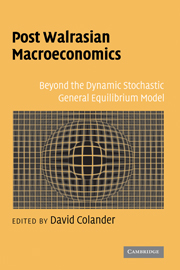Book contents
- Frontmatter
- Contents
- List of Contributors
- Foreword by Alan Kirman
- Introduction
- PART I WHERE WE ARE IN MACRO AND HOW WE GOT THERE
- 1 Episodes in a Century of Macroeconomics
- 2 Post Walrasian Macroeconomics: Some Historic Links
- 3 The Problem of Time in the DSGE Model and the Post Walrasian Alternative
- 4 Who Is Post Walrasian Man?
- PART II EDGING AWAY FROM THE DSGE MODEL
- PART III LEAPING AWAY FROM THE DSGE MODEL
- PART IV LETTING THE DATA GUIDE THEORY
- PART V POLICY IMPLICATIONS
- Bibliography
- Index
1 - Episodes in a Century of Macroeconomics
Published online by Cambridge University Press: 02 December 2009
- Frontmatter
- Contents
- List of Contributors
- Foreword by Alan Kirman
- Introduction
- PART I WHERE WE ARE IN MACRO AND HOW WE GOT THERE
- 1 Episodes in a Century of Macroeconomics
- 2 Post Walrasian Macroeconomics: Some Historic Links
- 3 The Problem of Time in the DSGE Model and the Post Walrasian Alternative
- 4 Who Is Post Walrasian Man?
- PART II EDGING AWAY FROM THE DSGE MODEL
- PART III LEAPING AWAY FROM THE DSGE MODEL
- PART IV LETTING THE DATA GUIDE THEORY
- PART V POLICY IMPLICATIONS
- Bibliography
- Index
Summary
In this chapter, I give an alternative view to those of Blanchard (2000a) and Woodford (1999) of the history of macroeconomics over the century just past. One cannot attempt to tell the whole story in the space of a chapter. So my account will be episodic. I like to think of the history of thought as a decision tree with the current generation of economists occupying the highest twigs, not all of which will grow into sturdy branches bearing ample fruit. Down below in the tree are a number of more or less important forks, where our predecessors have decided to go one way rather than another. My intention is to revisit some of those forks, to try to understand how people saw the issues at the time and why the majority chose the path that they took, and then ask how the choices made look in hindsight. If we want to learn from the history of thought, I believe, this is the way we have to go about it.
WICKSELL AND FISHER
One hundred years ago, economists had some quantitative information on money, interest and prices, and on very little else. So the story begins with monetary theory and the two great names of Irving Fisher and Knut Wicksell. Fisher and Wicksell shared a passionate concern for distributive justice that is no longer in much evidence among macroeconomists. Their shared conviction that changes in the price level had arbitrary and unfair distributive effects motivated their work on monetary theory.
- Type
- Chapter
- Information
- Post Walrasian MacroeconomicsBeyond the Dynamic Stochastic General Equilibrium Model, pp. 27 - 45Publisher: Cambridge University PressPrint publication year: 2006
- 15
- Cited by



